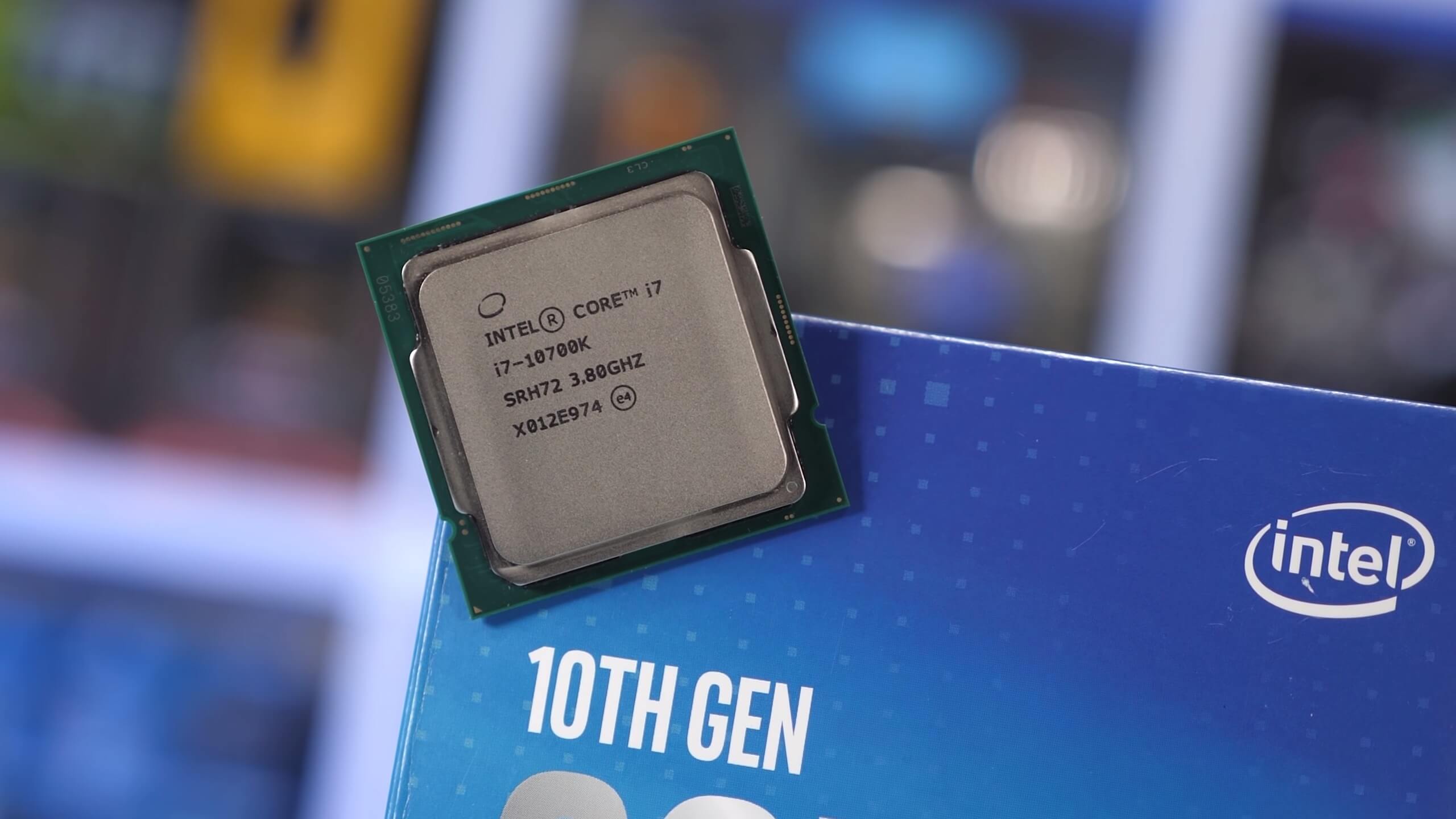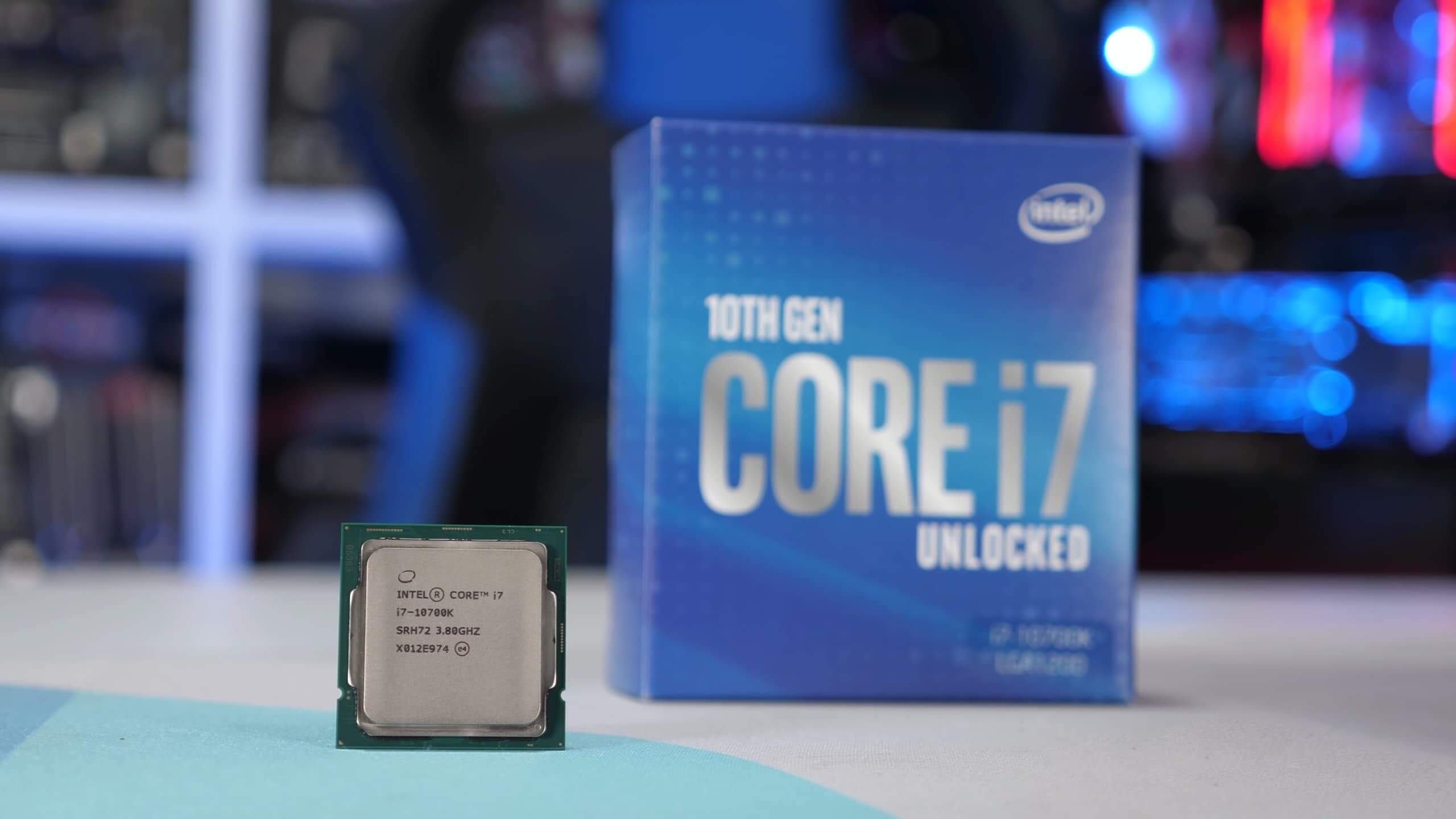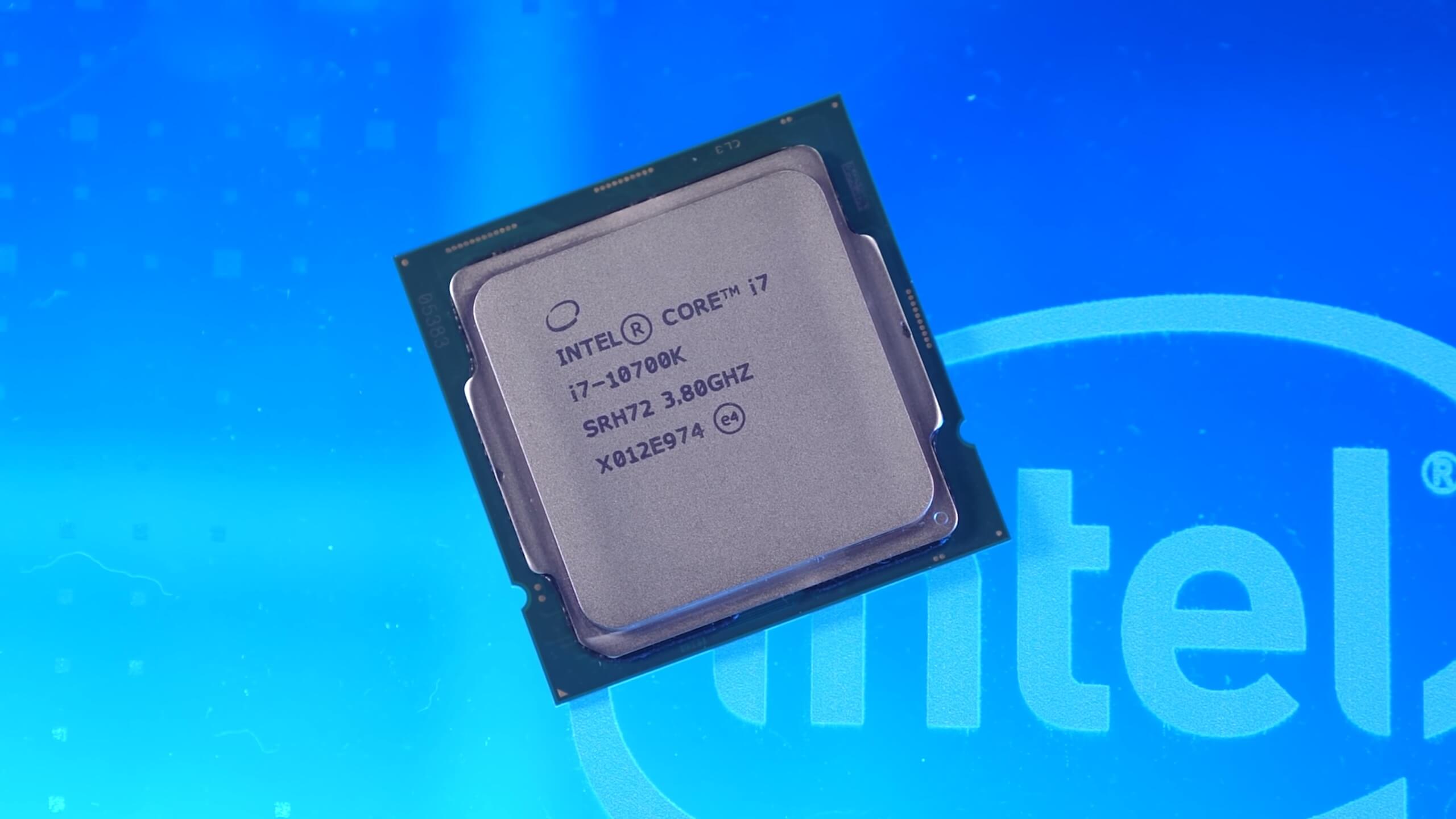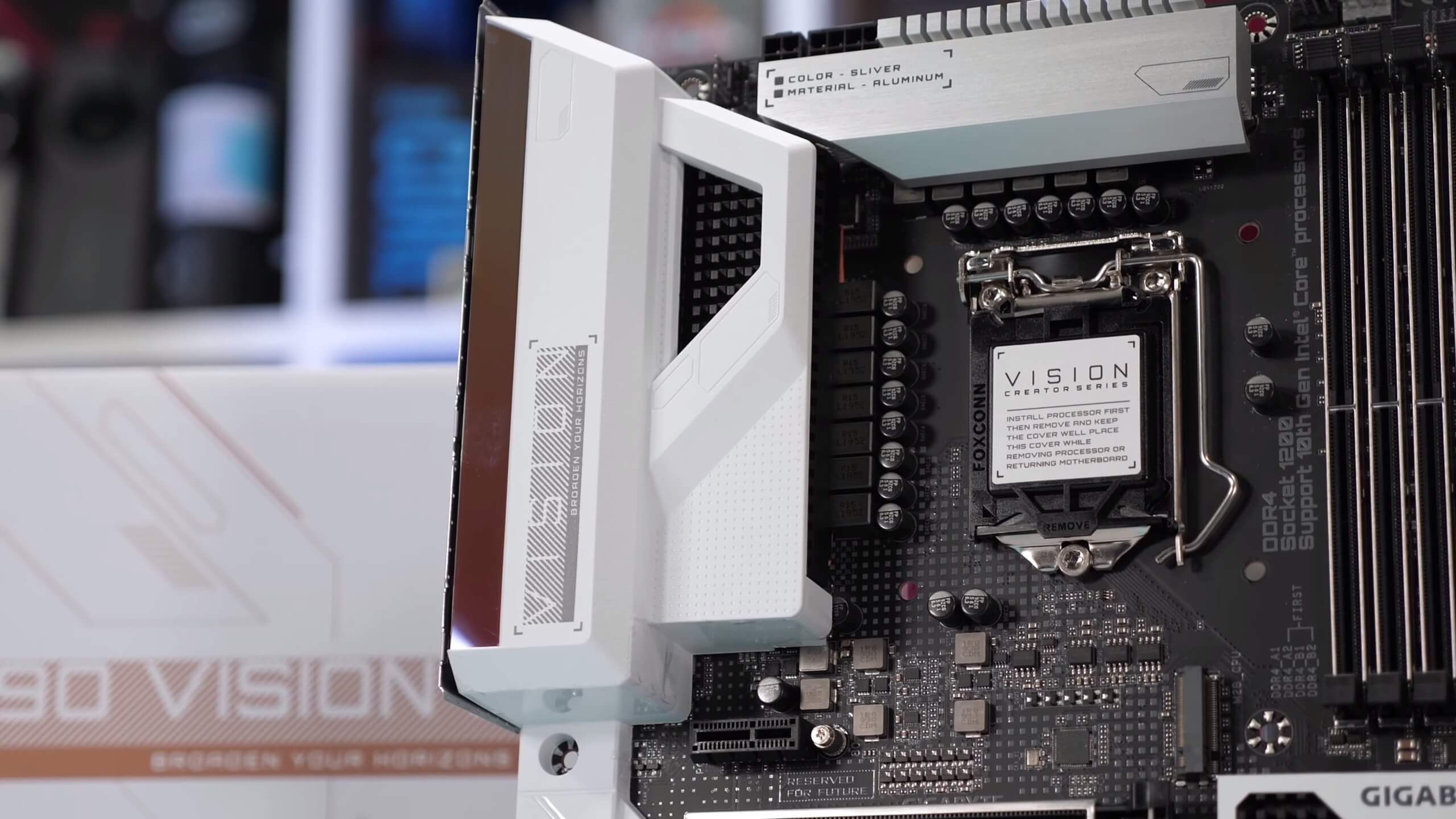Earlier this week we reviewed Intel's new Core i9-10900K and found that it was a strong performer, but it fell short of impressing in a world dominated by AMD's Ryzen lineup. For $500-ish it's a lot more expensive than the Ryzen 9 3900X, it's slower in most applications, while it carries a minor advantage in games.
In the end, we couldn't really say who would buy 10900K. The more affordable Core i7-10700K though, now this looks to be a more interesting part. Essentially what we have here is a Core i9-9900K at a 25% discount, as Intel has set the MSRP at $375. Even if you won't be able to immediately find it at that price, it's a reasonable discount over the previous gaming king, the 9900K which can still be found retailing for $530. But will that be enough?
The Core i7-10700K is an 8-core, 16-thread CPU, same as the 9900K, but whereas the Coffee Lake part features a base clock of 3.6 GHz, the 10700K won't drop below 3.8 GHz and as a result the TDP has been increased to 125 W. The boost clock frequency has also been increased by 100 MHz, which sees the 10700K hit 5.1 GHz. L3 cache goes unchanged with both models sporting a 16 MB capacity.
That's the 10700K in a nutshell, time to get into the benchmarks!
We tested all Ryzen processors using the Gigabyte X570 Aorus Master, 8th and 9th-gen Intel processors were benched on the Gigabyte Z390 Aorus Ultra, and the new Intel 10th-gen Core CPUs on the Asus ROG Maximus XII Extreme. For this review we're going to look exclusively at results for Intel CPUs that aren't power limited, so no TDP limited testing. This is typically how we test Intel CPUs, such as the 9900K, for example, and this is also how the majority of Z490 boards operate out of the box. So while we'll be using the default clock multiplier tables, none of the Intel CPUs are adhering to any power limits.
What this means for the 10700K is that under load the all-core clock speed is 4.7 GHz and that frequency will be maintained for the duration of the test. This is the same all-core clock frequency that the 9900K operates at. Finally, all configurations were equipped with a GeForce RTX 2080 Ti, 32GB of DDR4-3200 CL14 memory and a Corsair Hydro H150i Pro 360mm all-in-one liquid cooler.
Benchmarks
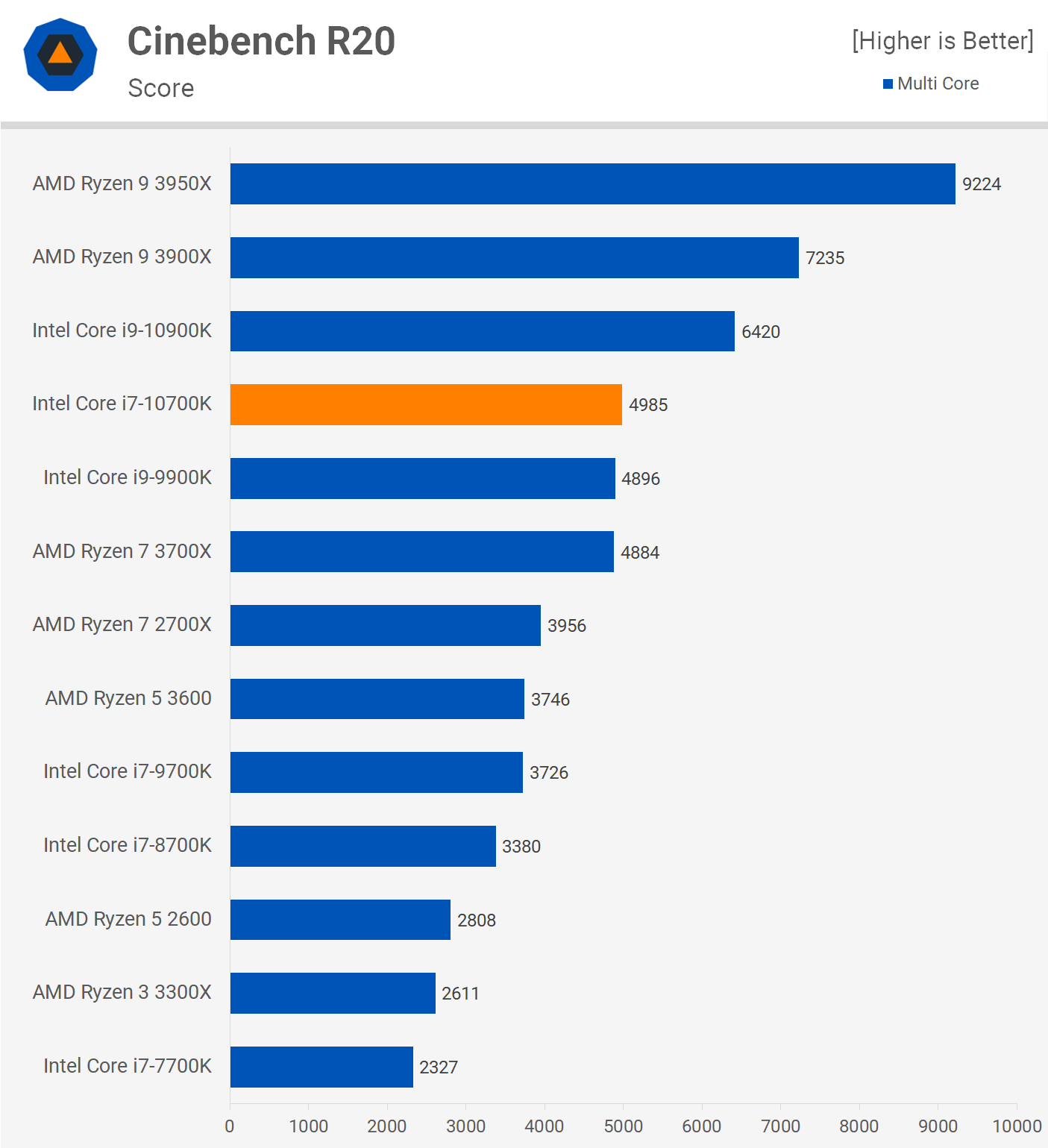
As usual we'll start with Cinebench R20 multi-core and here we see that the 10700K is indeed able to match the 9900K, with a score of 4985 pts. The 2% increase we see is within the margin of error, even for our 3 run average.
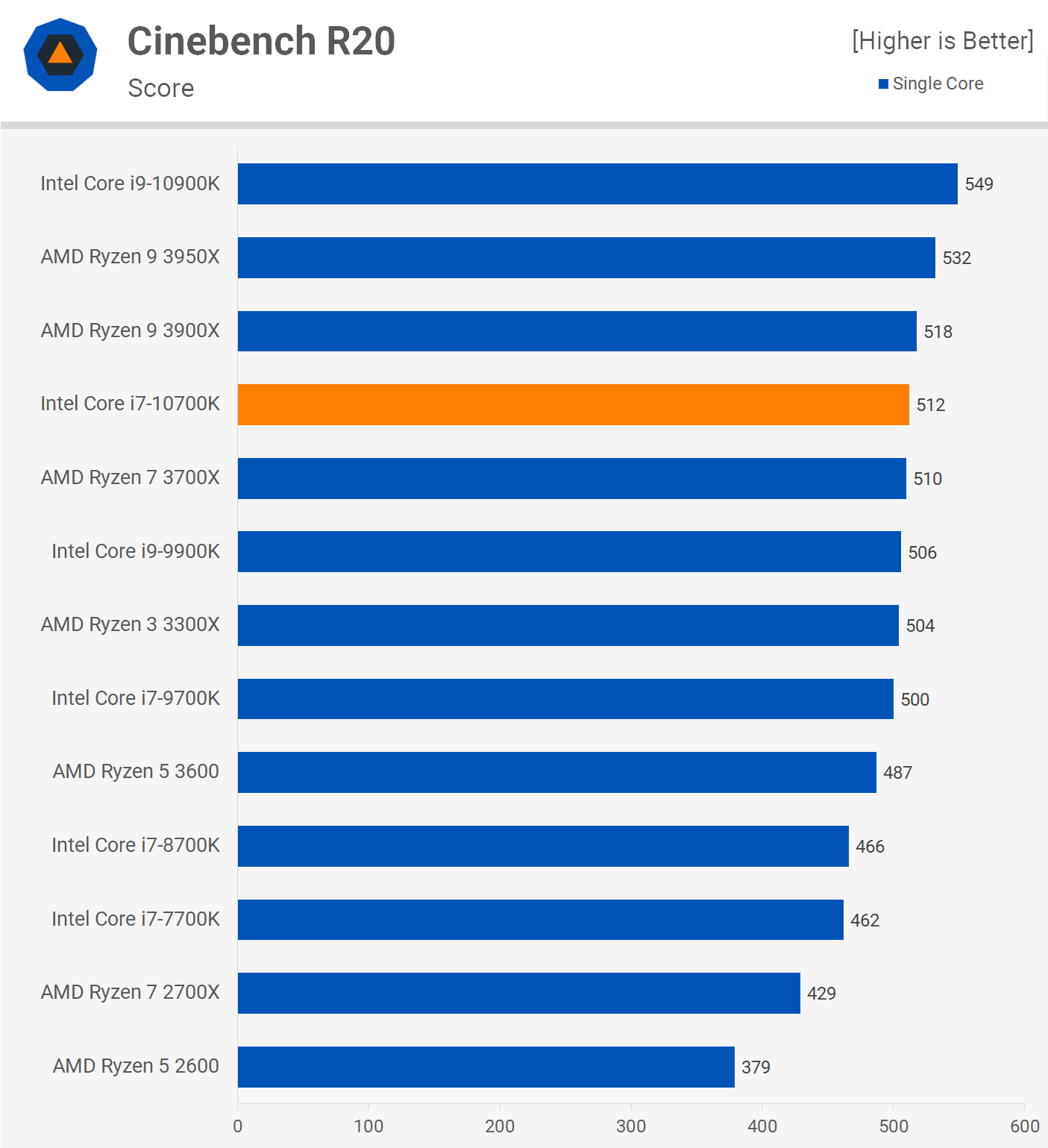
When looking at single core performance we see that while the 10700K is very strong, it's not exceptional, basically matching the 9900K, 3700X and 3900X.
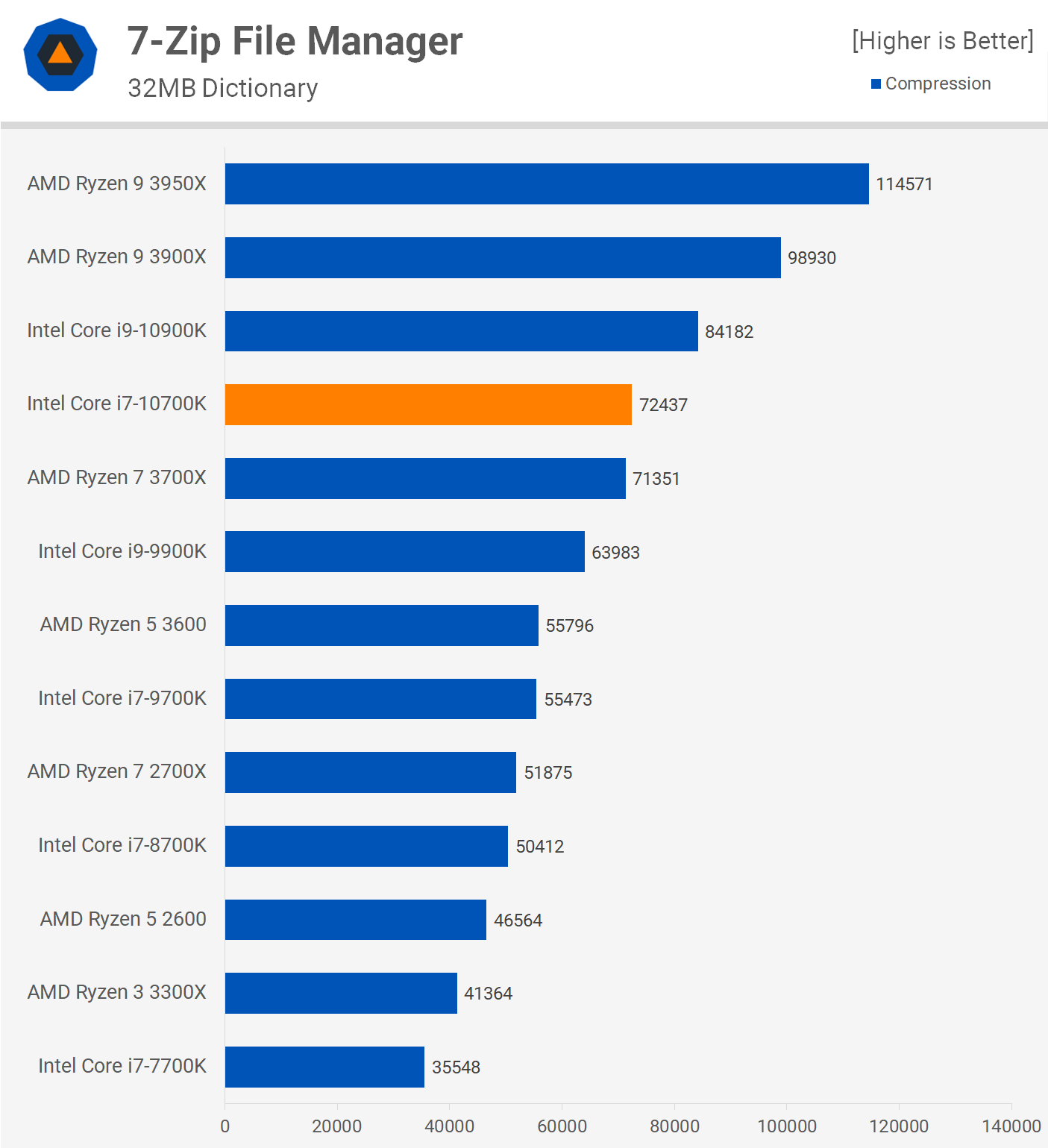
Moving on to 7-zip compression performance, the 10700K is just 1.5% faster than the 3700X and 37% slower than the 3900X. With the 3900X currently selling for about $415, it reigns the test and has Intel showing a large performance deficit to AMD at the same price point.

Things get worse for Intel in the decompression test where the 10700K is 9% slower than the 3700X and that places it well behind the 3900X, losing by a 39% margin.

The AES 256-bit encryption performance is interesting, because here we see that the 10700K is a bit slower than the 9900K, trailing by a 6% margin. Given these two CPUs are identical in terms of specs, but the 10700K clocks higher, that shouldn't be possible. But the Comet Lake architecture does introduce a number of hardware level security fixes and we saw with Cascade Lake-X that this did at times reduce performance, so I believe that's what we're looking at here.
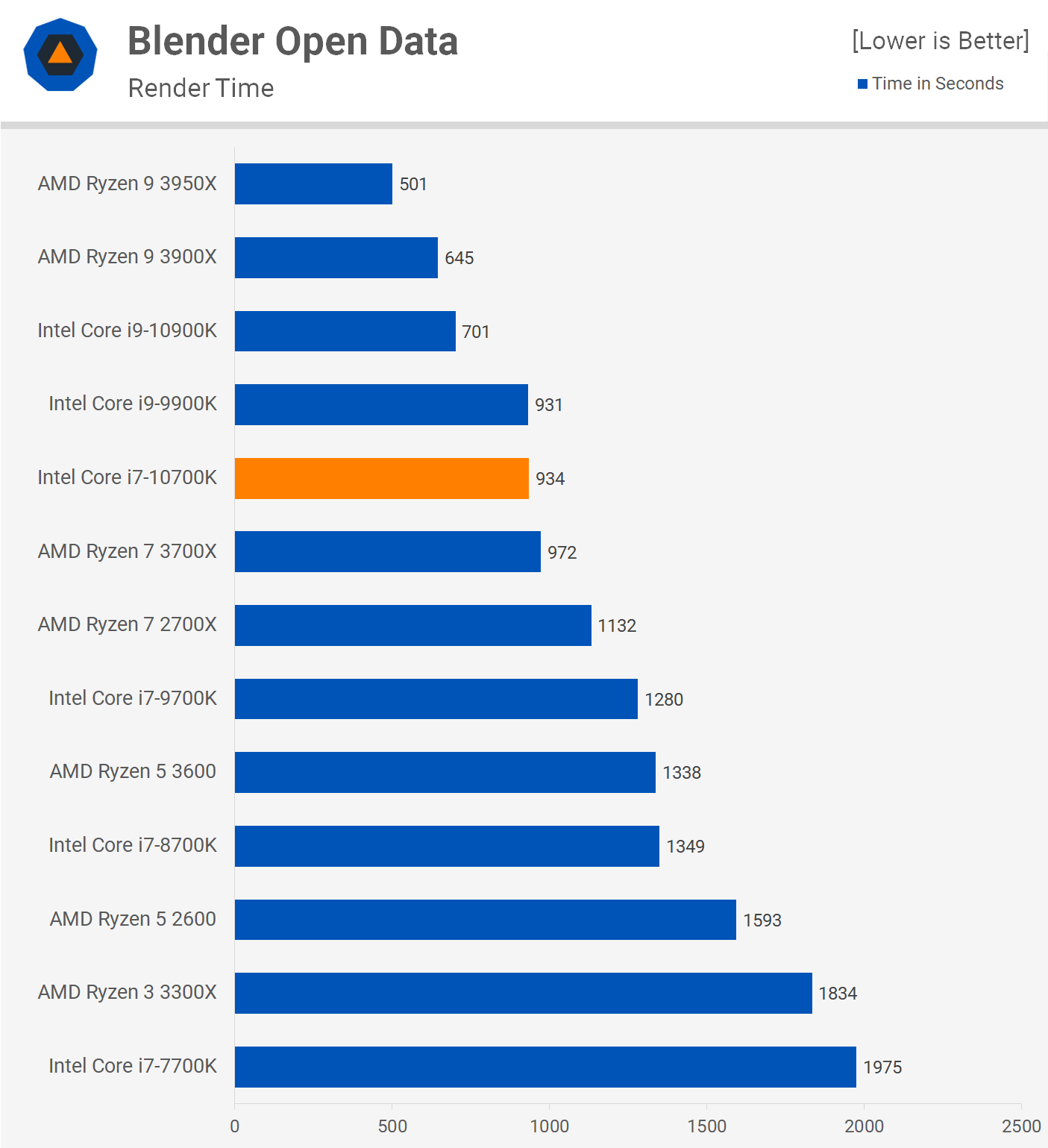
The 10700K was also slower than the 9900K in Blender's Open Data benchmark, though we're talking a few seconds here, so performance was basically identical.

The V-Ray performance is very typical of what we've seen so far. Here the 10700K is 4% faster than the 9900K and that meant it was almost 30% slower than the Ryzen 9 3900X.

The 10700K performed as expected in Corona, edging out the 9900K by a slim margin. It was also 14% faster than the 3700X, but 24% slower than the 3900X. An expected result but in the grand scheme of things, not a particularly good result for Intel.
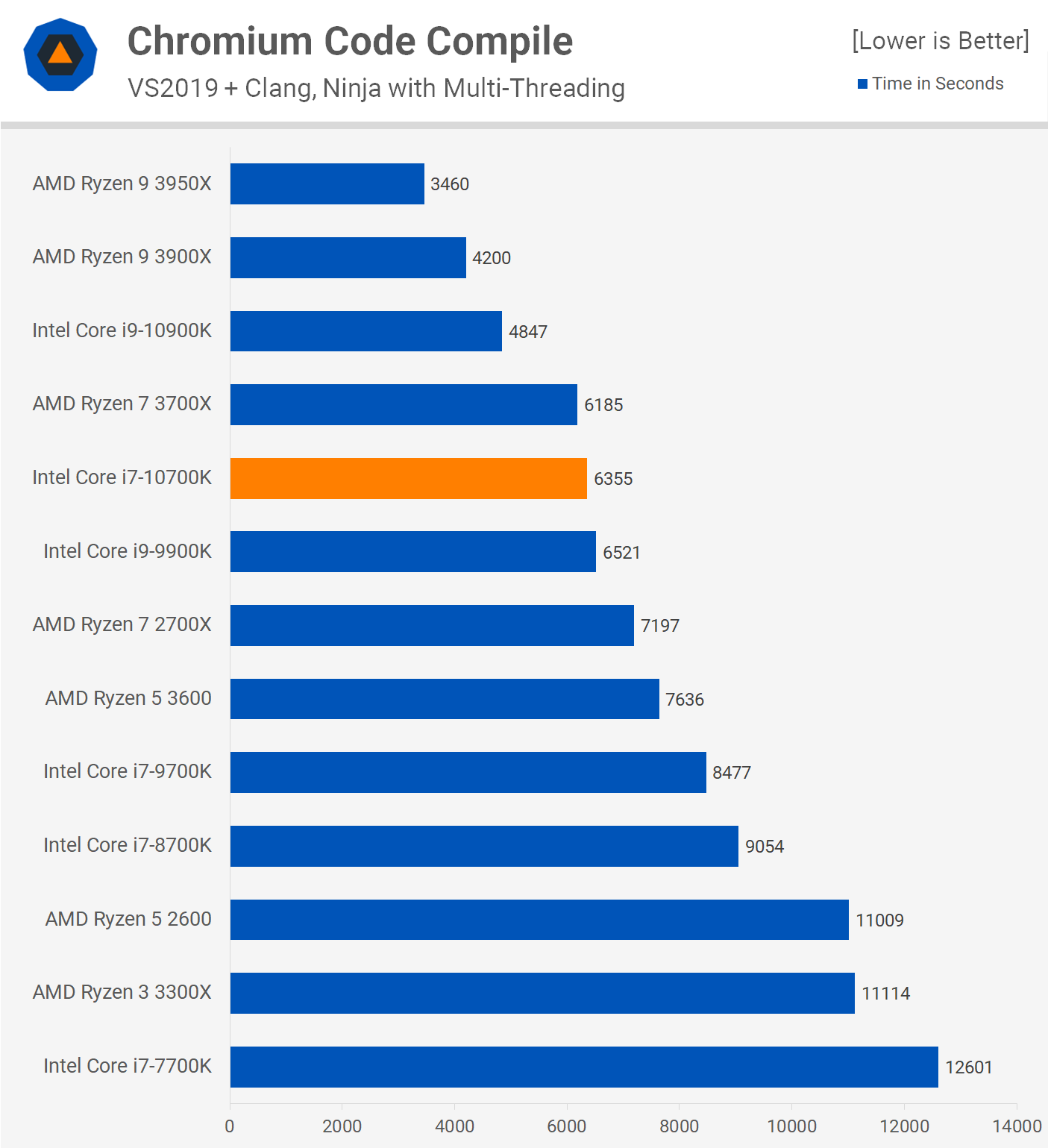
Code compilation performance sees the 10700K just edge ahead of the 9900K, making it slightly slower than the 3700X and a whopping 33% slower than the 3900X. So again performance is as expected, but when it comes to serious productivity work Intel appears outgunned by the competing Ryzen processors.

Moving on to DaVinci Resolve Studio performance, the 10700K is 6% faster than the 9900K, allowing it to match the 3700X. That still saw it come in 9% slower than the 3900X, but that's not a huge difference, despite not being a great result.
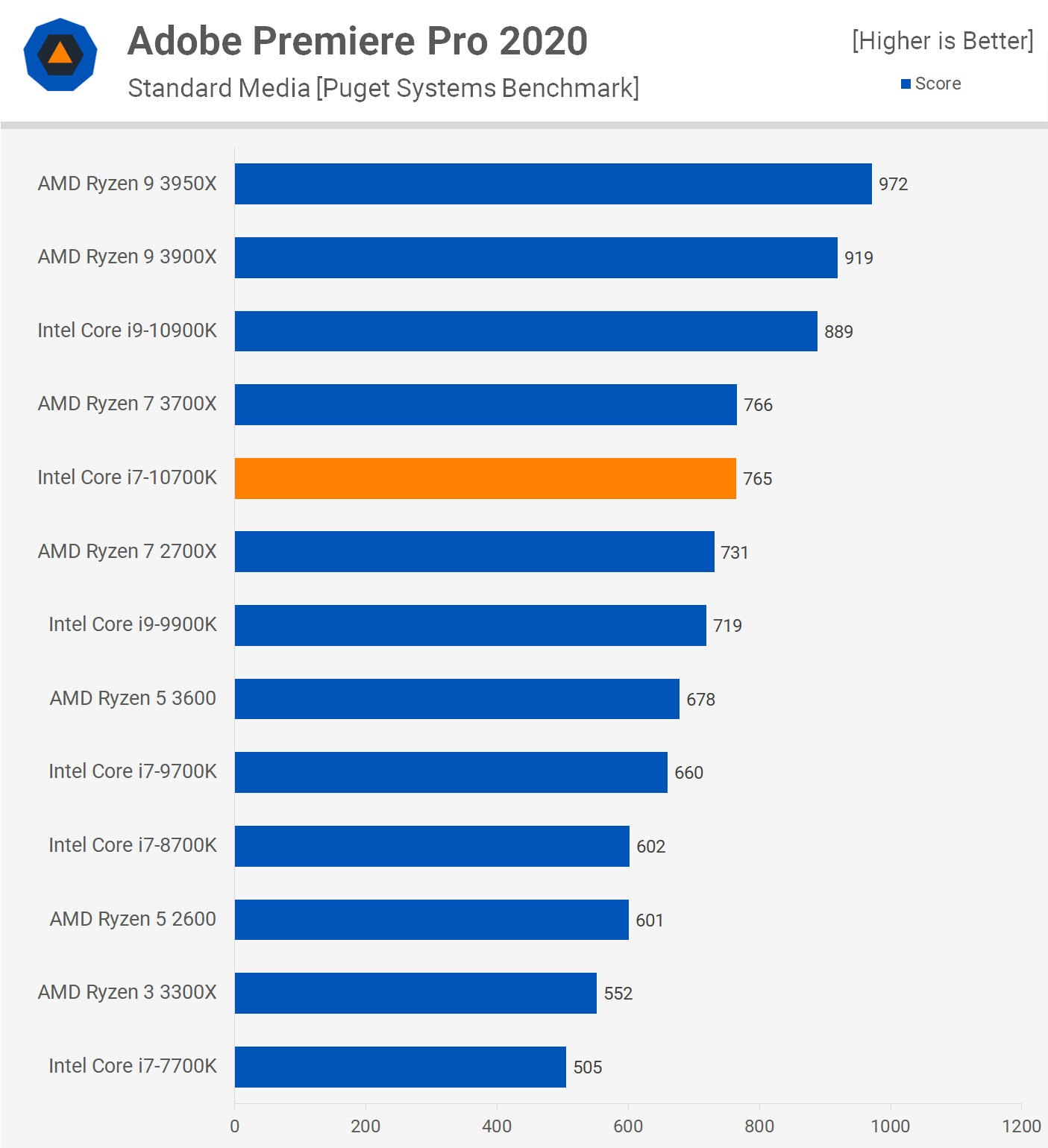
The performance margins seen in Premiere Pro are very similar to those of DaVinci Resolve. The 10700K is able to match the 3700X and that meant it was 6% faster than the 9900K.
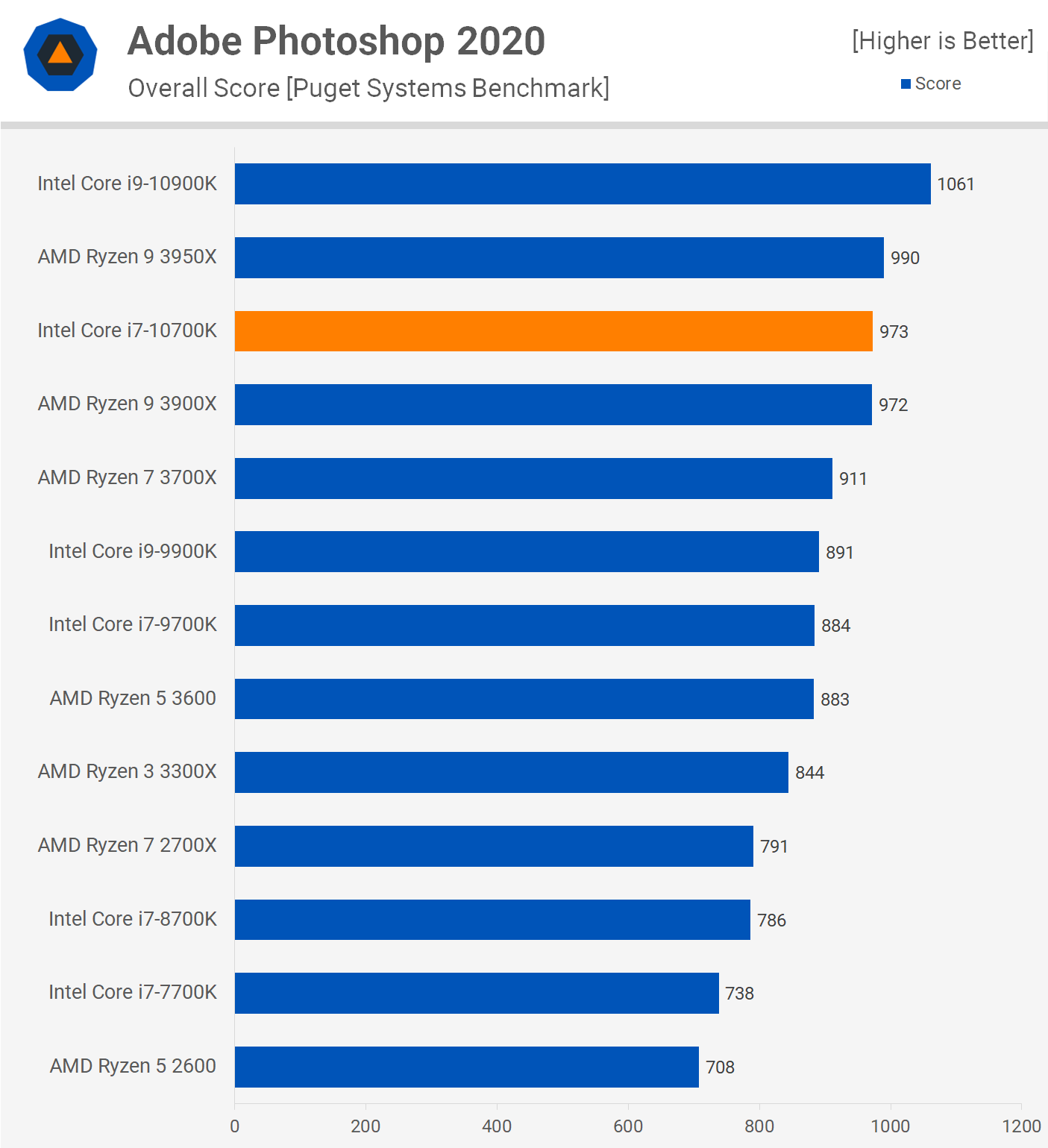
Intel's higher clocked CPUs do perform well in Photoshop and while the 10700K doesn't destroy the 3900X, at least it's able to match it here, and that's not something we've seen much of.
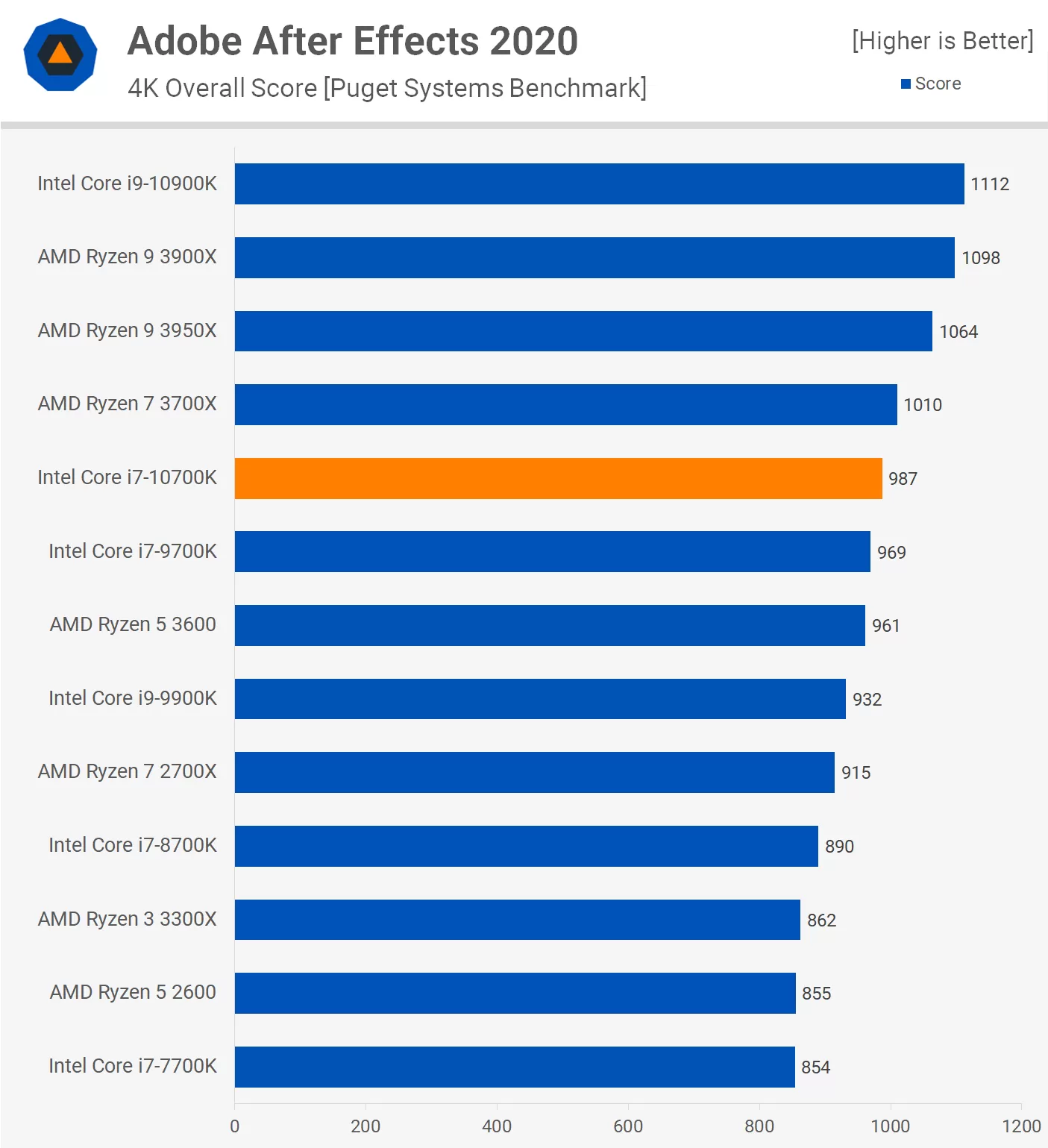
Performance in After Effects is average, despite the 10700K offering a 6% performance uplift over the 9900K. That meant it was still slower than the 3700X and 10% slower than the 3900X.

Moving on to power consumption, what we see here are total system consumption numbers. The 10700K matched the 3900X at 230 watts and that means in terms of performance per watt Intel is at a significant disadvantage, but that's certainly not news to anyone at this point. Anyway, the 3900X was 60% faster than the 10700K in Blender, so that's a significant advantage in terms of performance per watt.
Gaming Performance
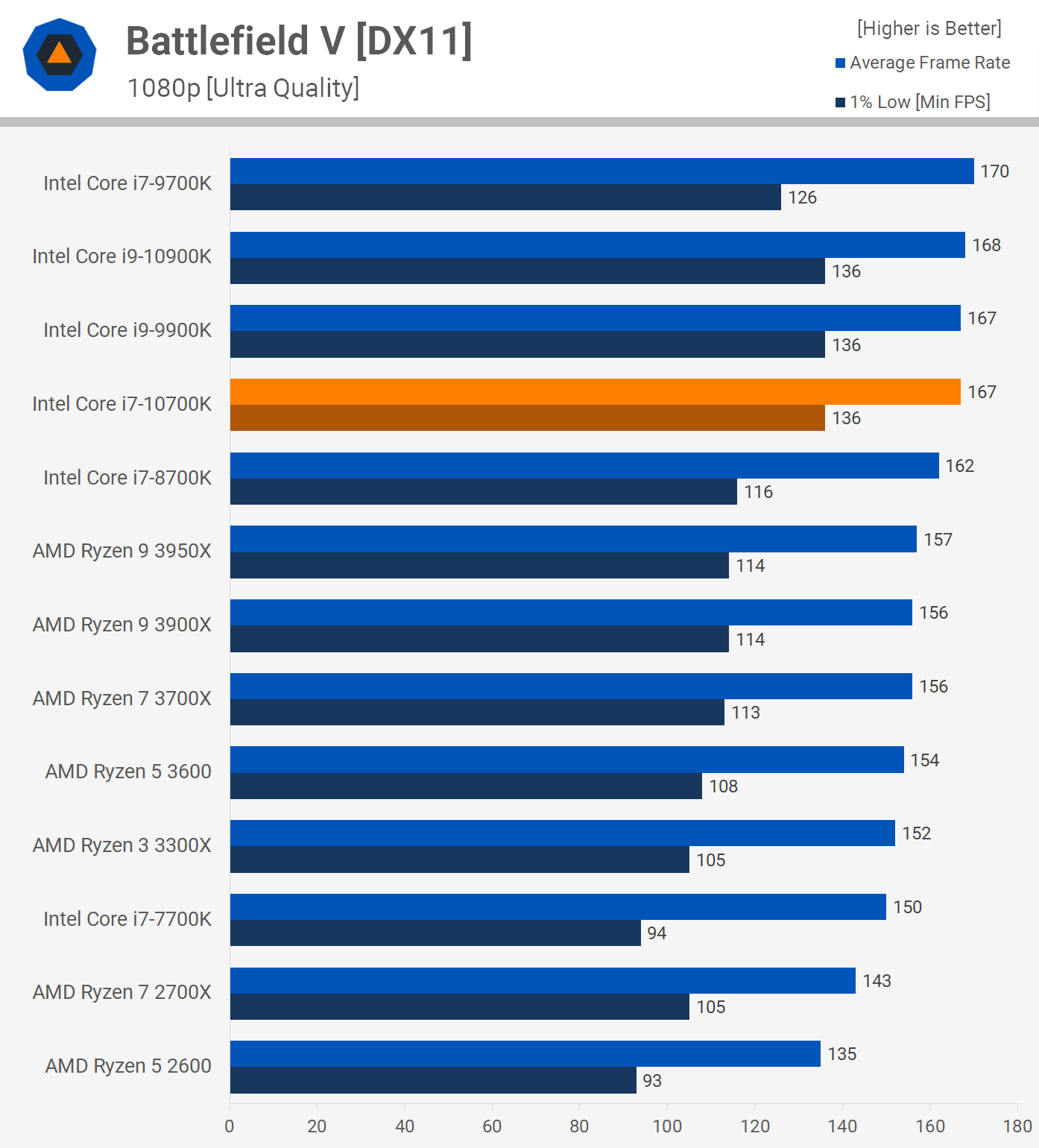
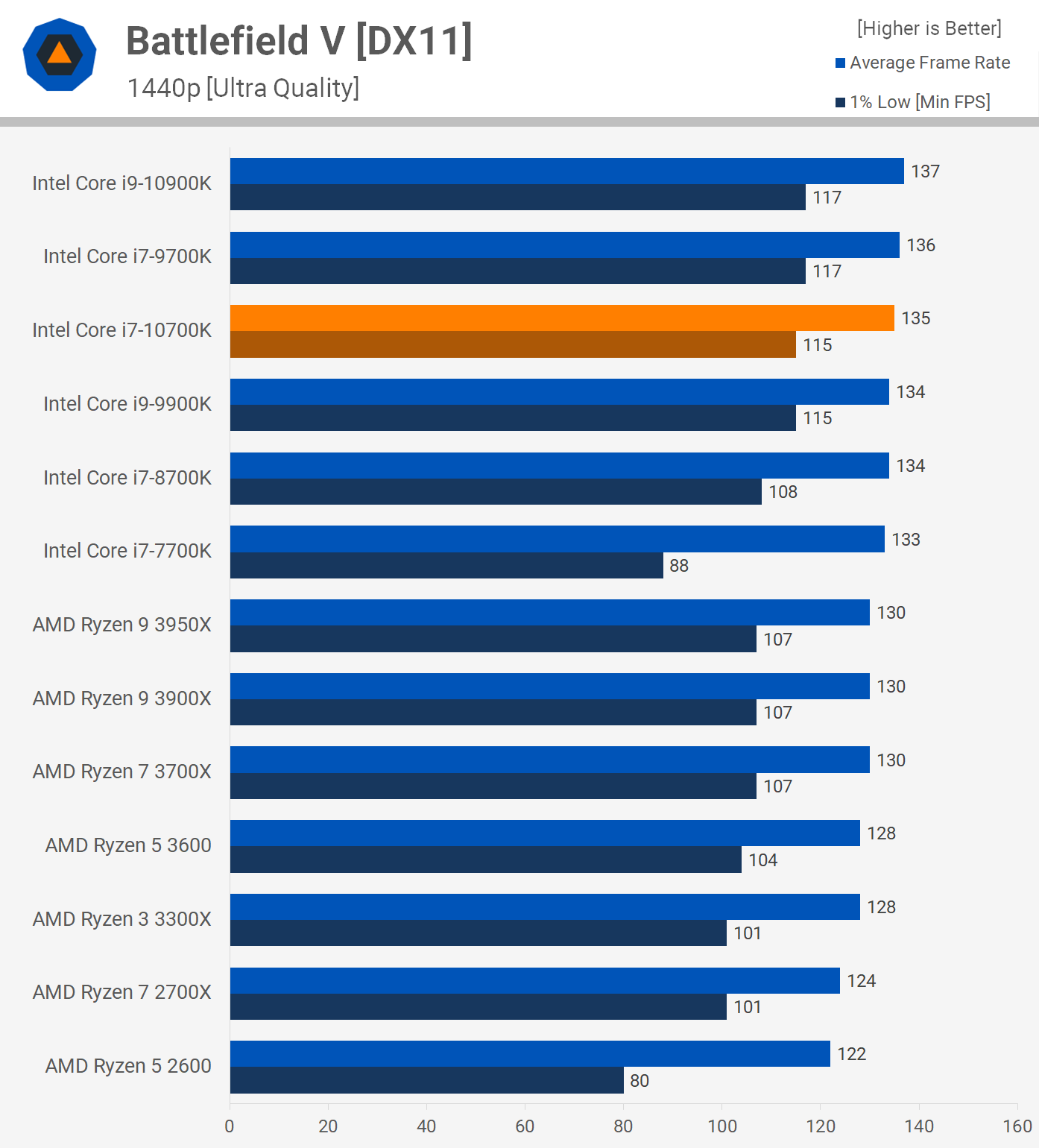
Starting with Battlefield V at 1080p using the ultra quality preset, and of course we're using an RTX 2080 Ti graphics card. Here the 10700K matched the 9900K and 10900K to deliver the best and most consistent gaming experience of the CPUs tested.
The 1% low performance was 19% better than what we see with the 3rd-gen Ryzen processors, despite the more marginal difference in average frame rates. Still this is a strong gaming result for Intel and it's great to see 9900K-like performance at a more affordable price.
If you play at 1440p, and I like to think this is the minimum resolution people rocking an RTX 2080 Ti would target, then the difference between the 10700K and the 3900X, for example, is basically indistinguishable.
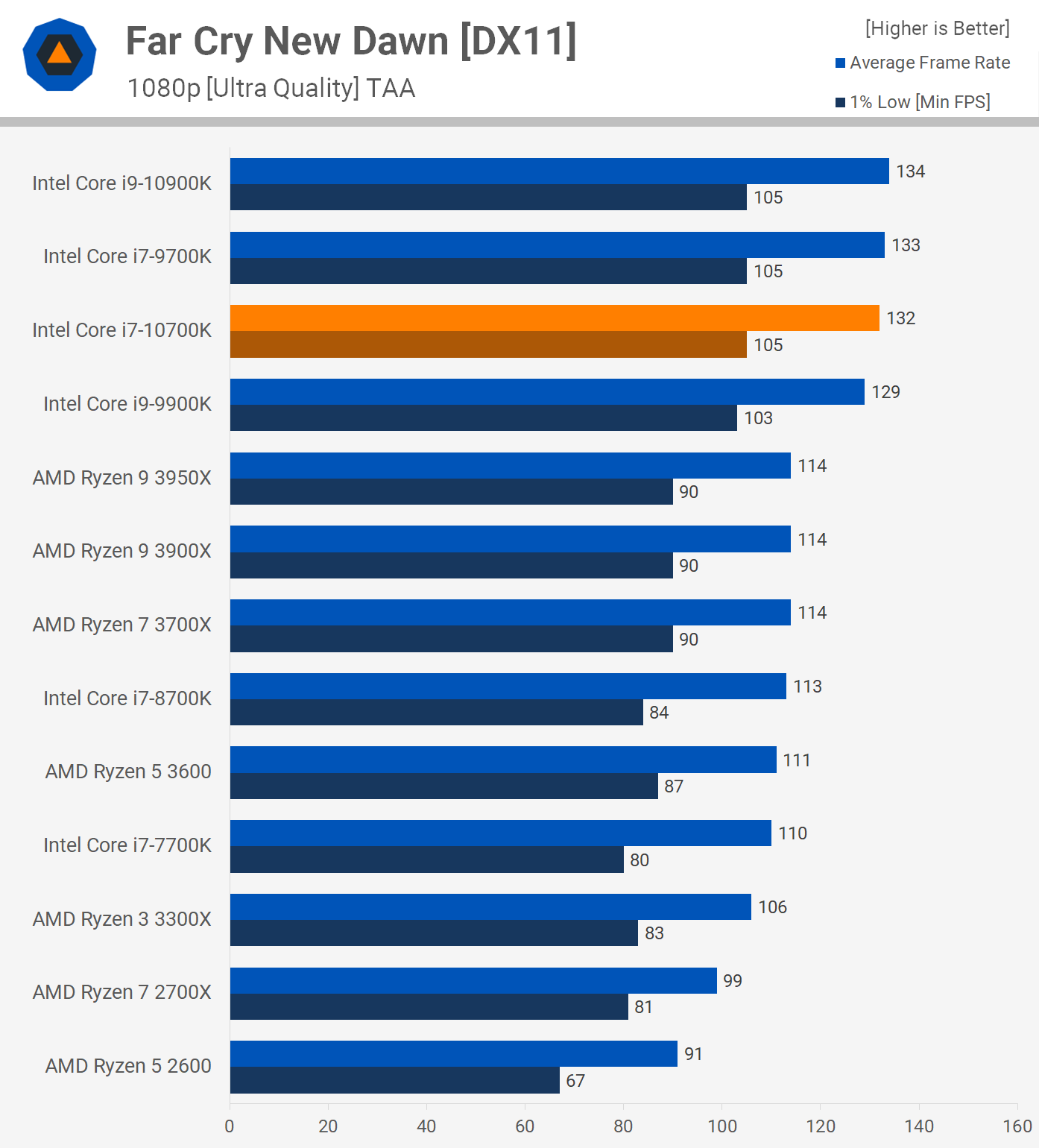
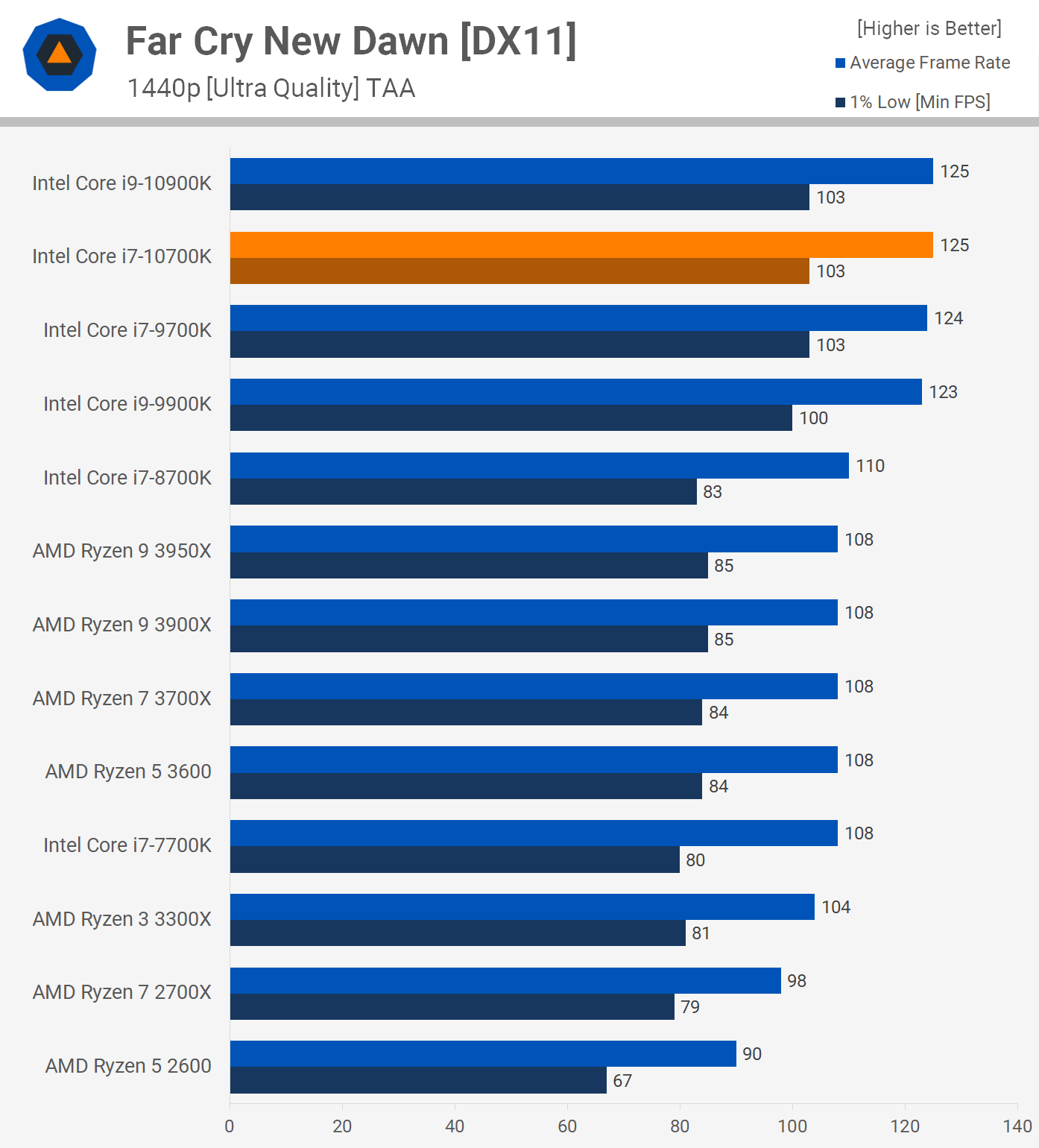
Next up we have Far Cry New Dawn and again we're looking at 9900K and even 10900K-like performance with the 10700K. That's good news but also not unexpected. The Far Cry series has always favored Intel CPUs and we like to include it as this is a worst case scenario for AMD. While the 10700K will often be around 5% faster than the 3900X in gaming, there are titles such as Far Cry New Dawn where Intel is around 15% faster and that margin can even be seen at 1440p.
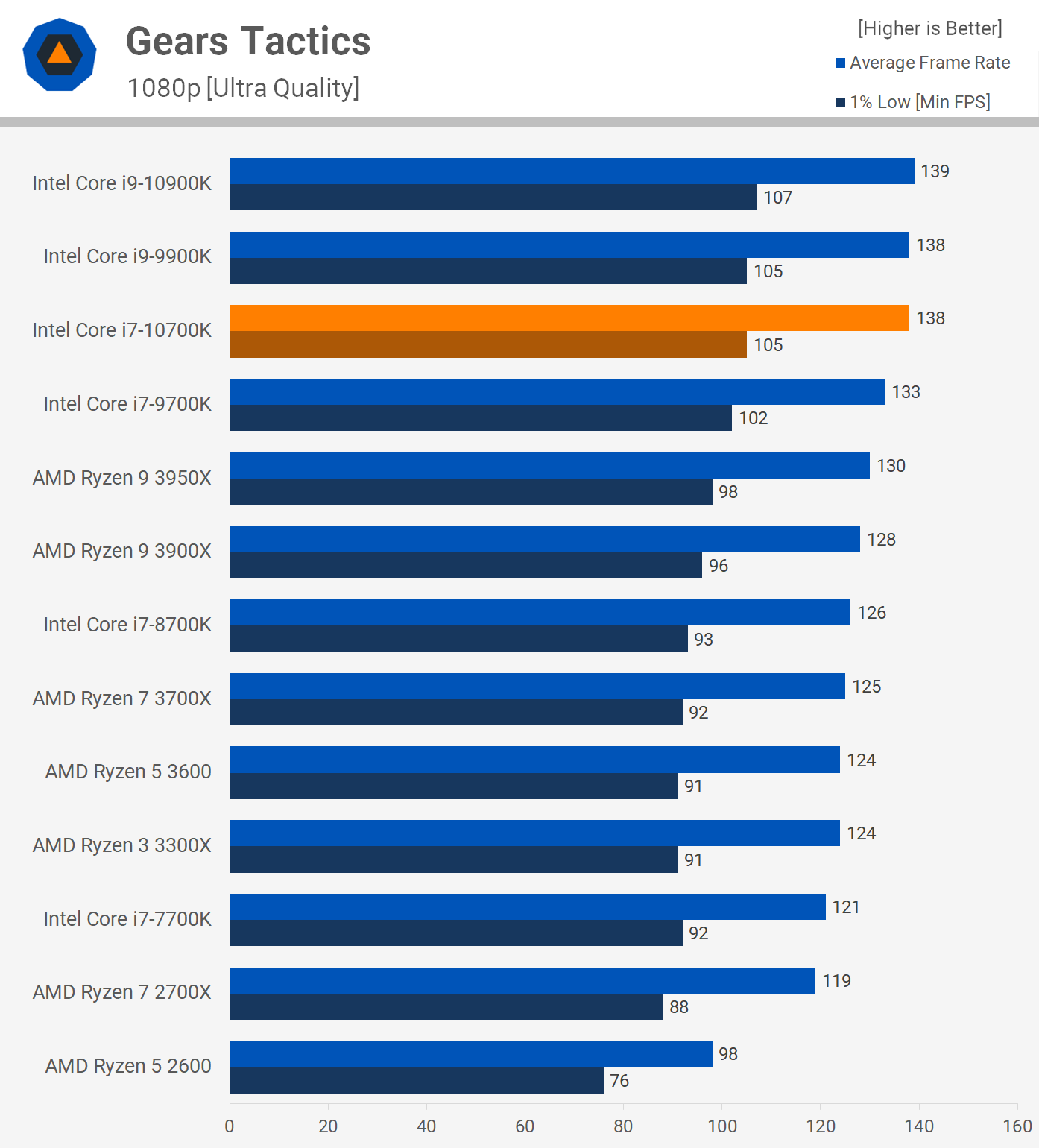
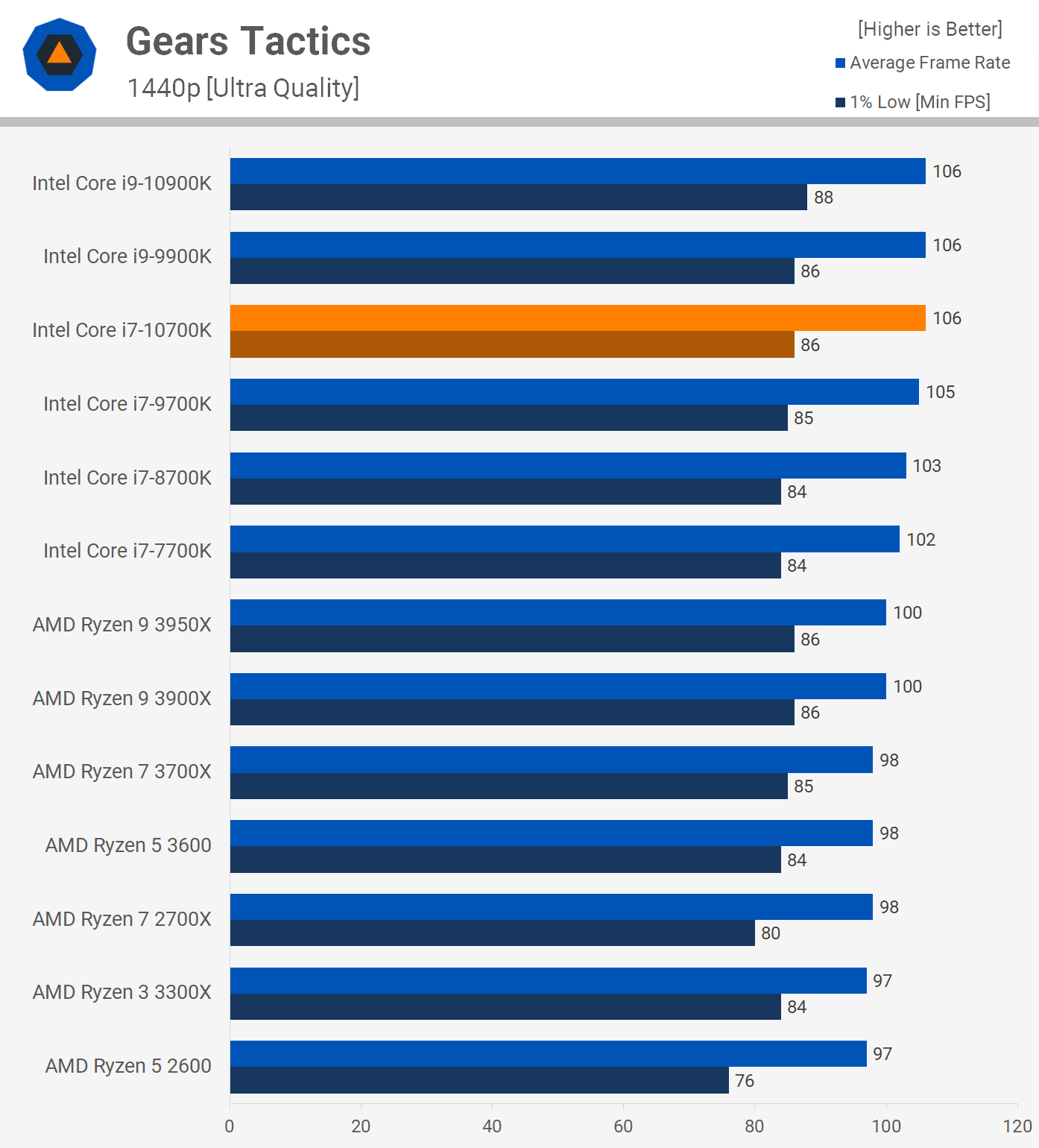
Performance in Gears Tactics also sees the 10700K match the 9900K and 10900K, pumping out 138 fps on average to make it 8% faster than the 3900X at 1080p. That margin is slightly reduced to 6% at 1440p, though the 1% low result is now identical, which means the gaming experience using either CPU will be indistinguishable.

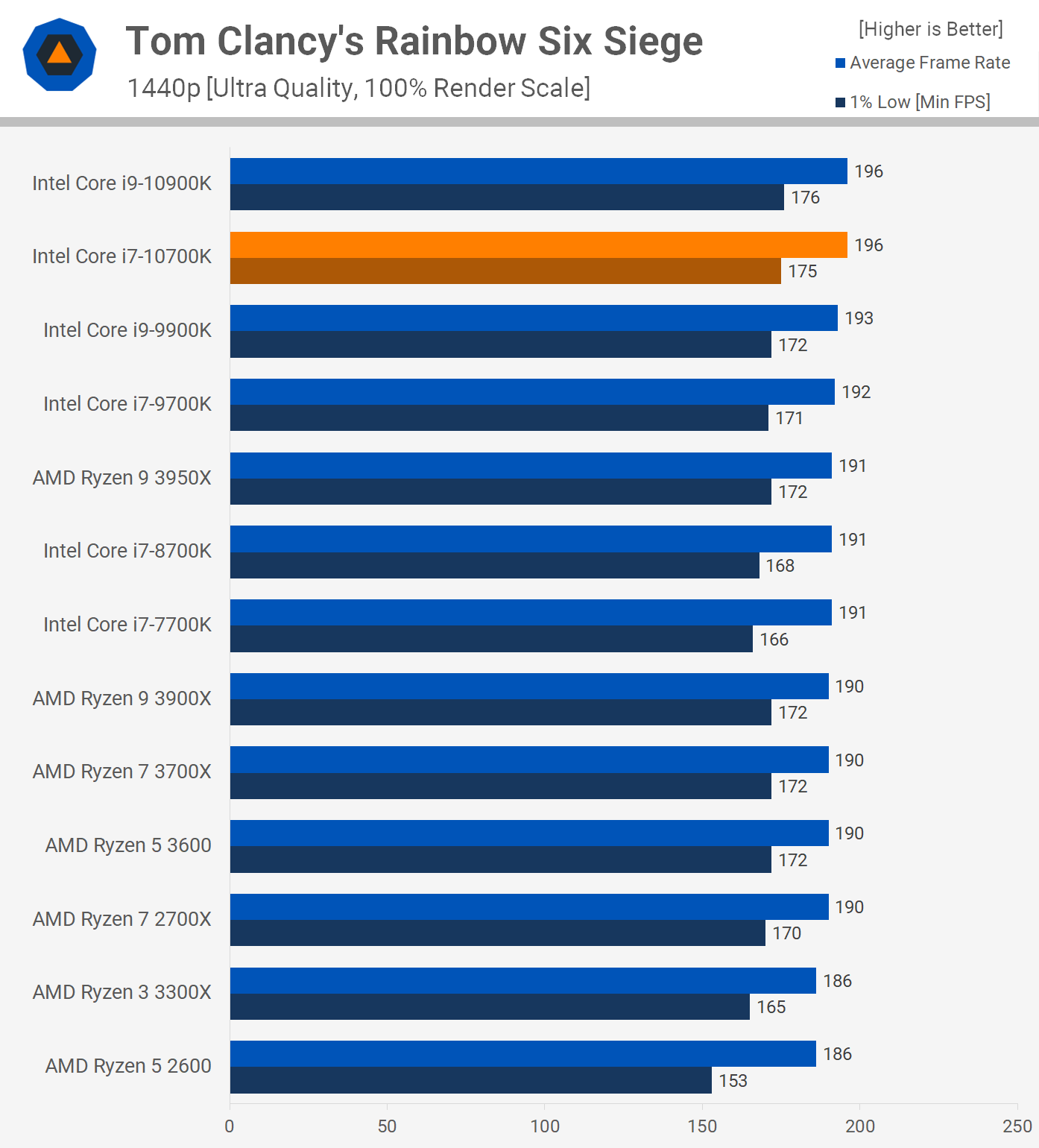
Tom Clancy's Rainbow Six Siege is a title where the 10900K was able to distance itself from the 9900K, albeit by a small margin. This advantage was made possible by the small increase in clock speed and we see that advantage is also shared by the 10700K. We're only talking about a 5% increase in 1% low performance though.
That advantage disappears at 1440p, here the 10700K is just a few frames faster than the 3900X and again that will see both processors deliver the same gaming experience.
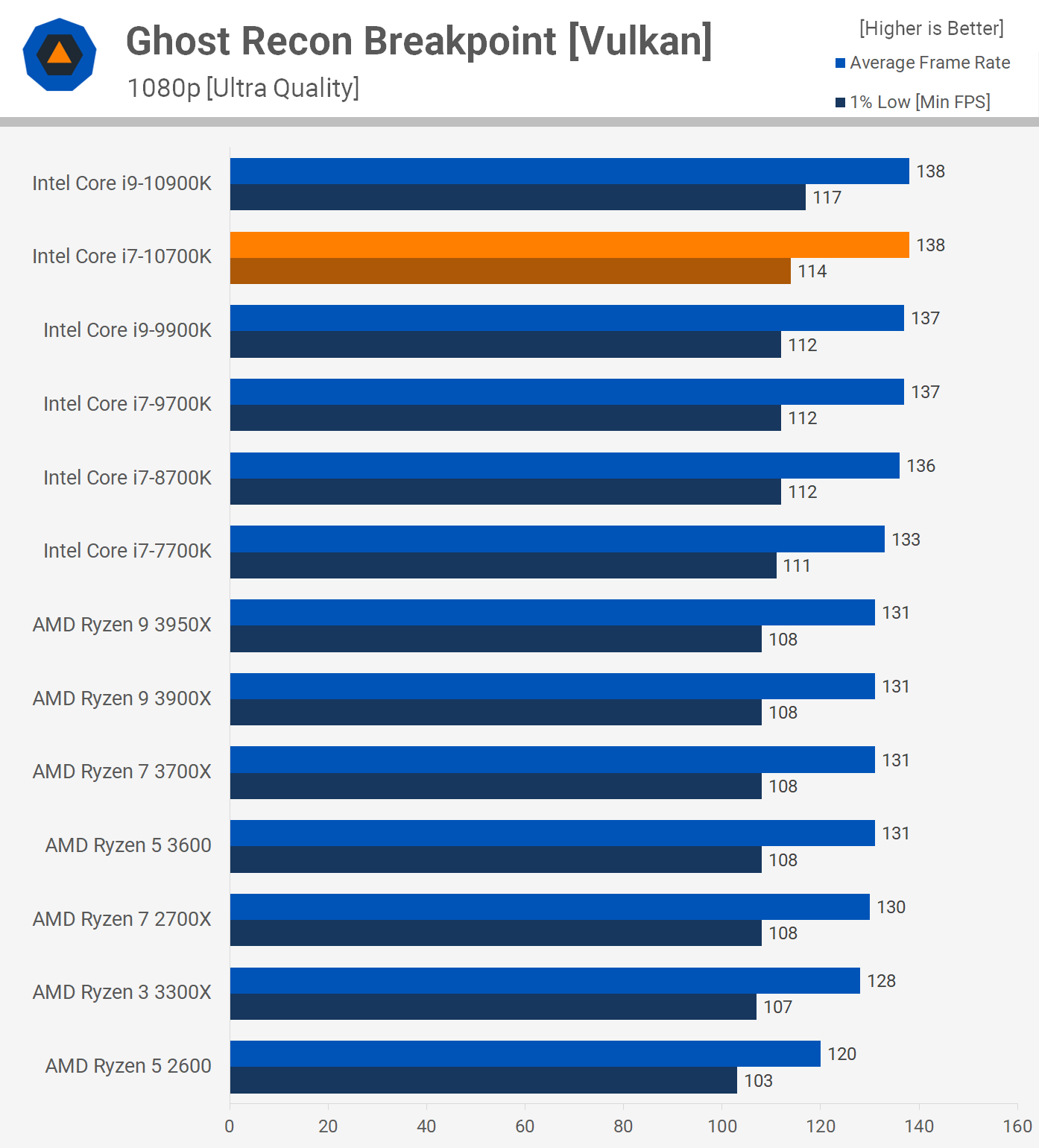
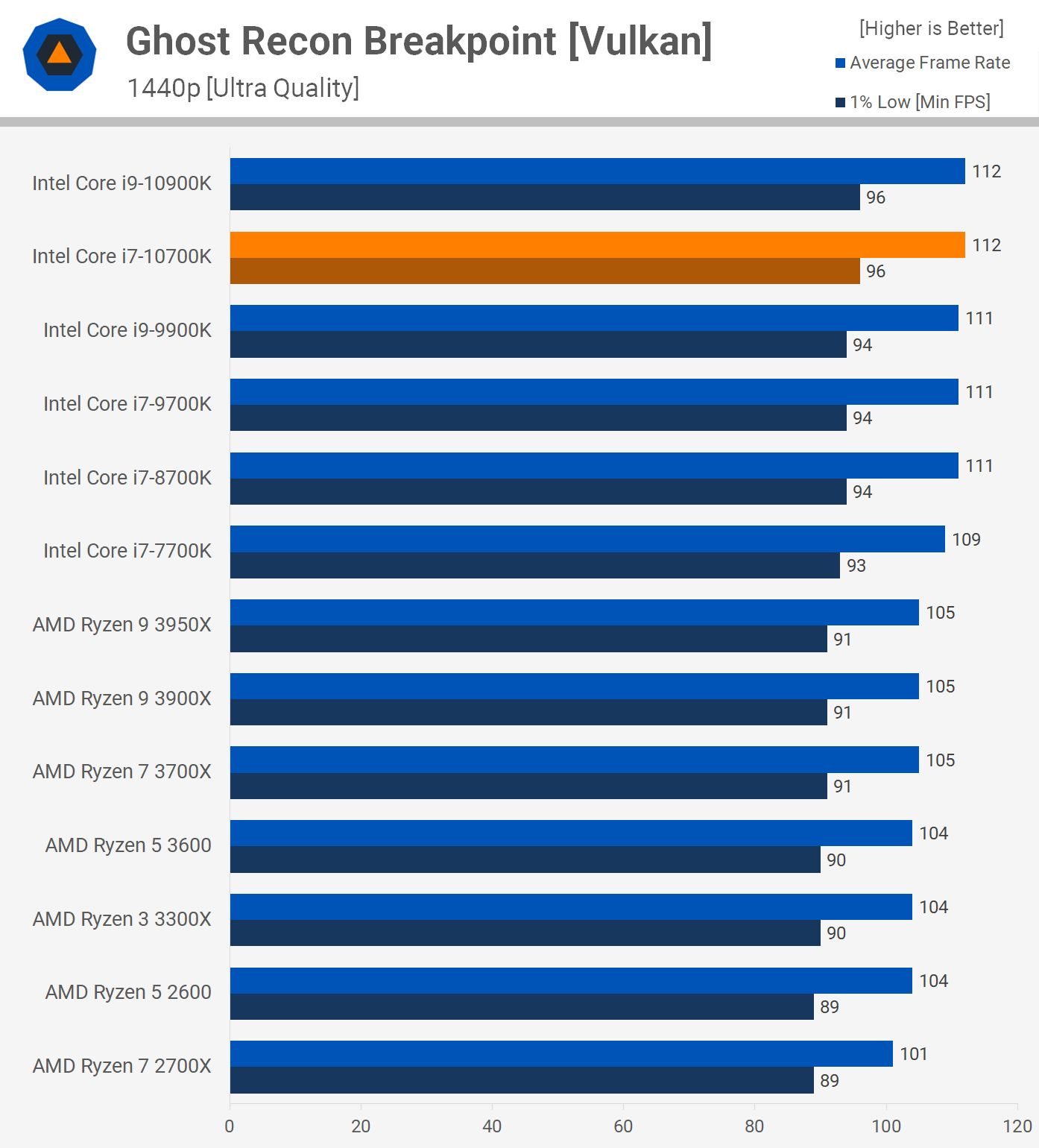
Ghost Recon Breakpoint also sees the 10700K match the 10900K and by extension the 9900K, 9700K and even the 8700K. Again, the 10700K was faster than the 3900X, but this time we're talking about just a 5% performance advantage at 1080p.
The margins remain much the same at 1440p, with the 10700K coming in 7% faster than the 3900X.
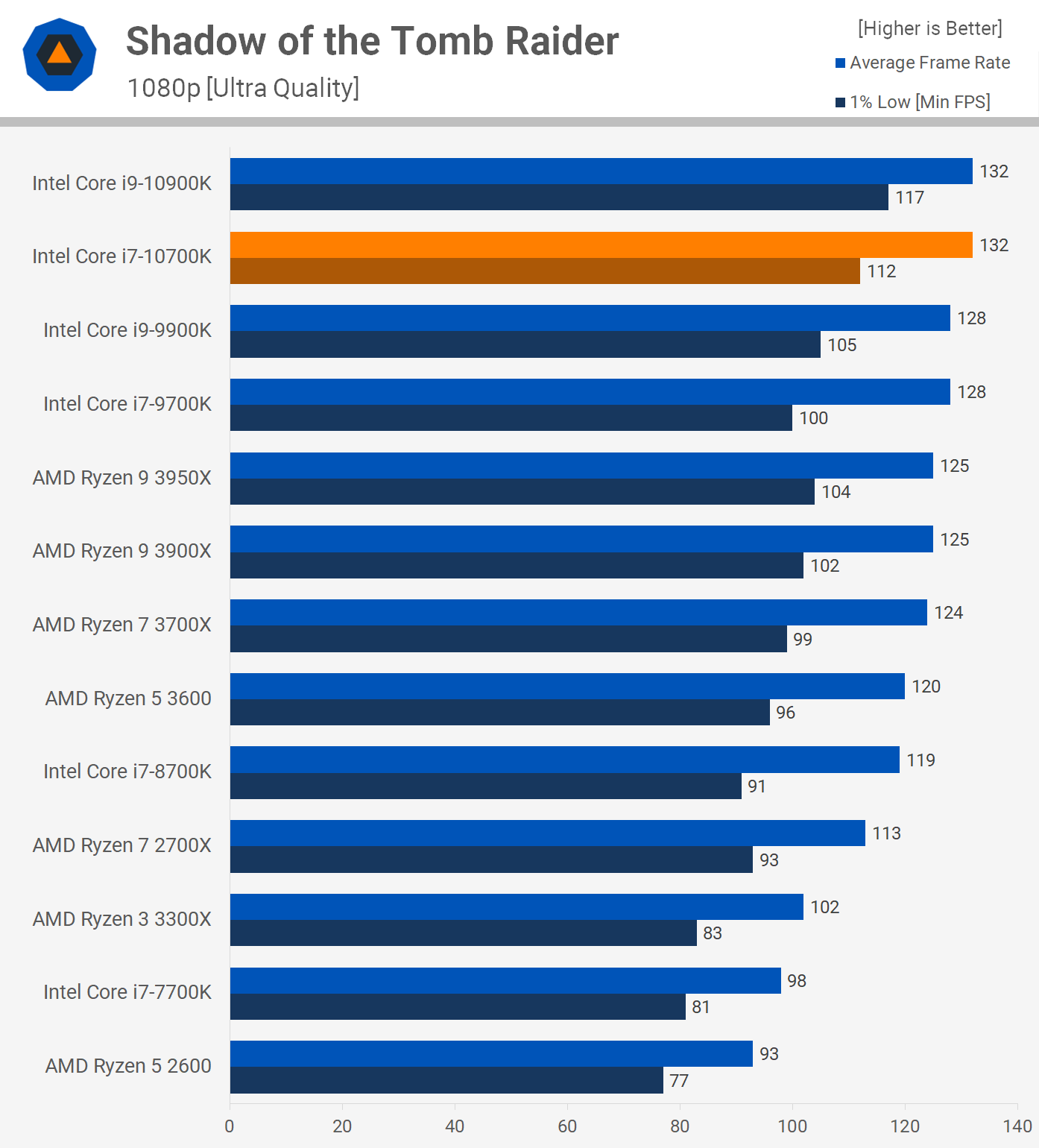

In Shadow of the Tomb Raider the 10700K was just a few frames off the pace of the 10900K and about 6% faster than the 3900X. Moving to 1440p we find that the 10700K is no faster than the 3900X, 3950X and 10900K, all delivering virtually identical performance.
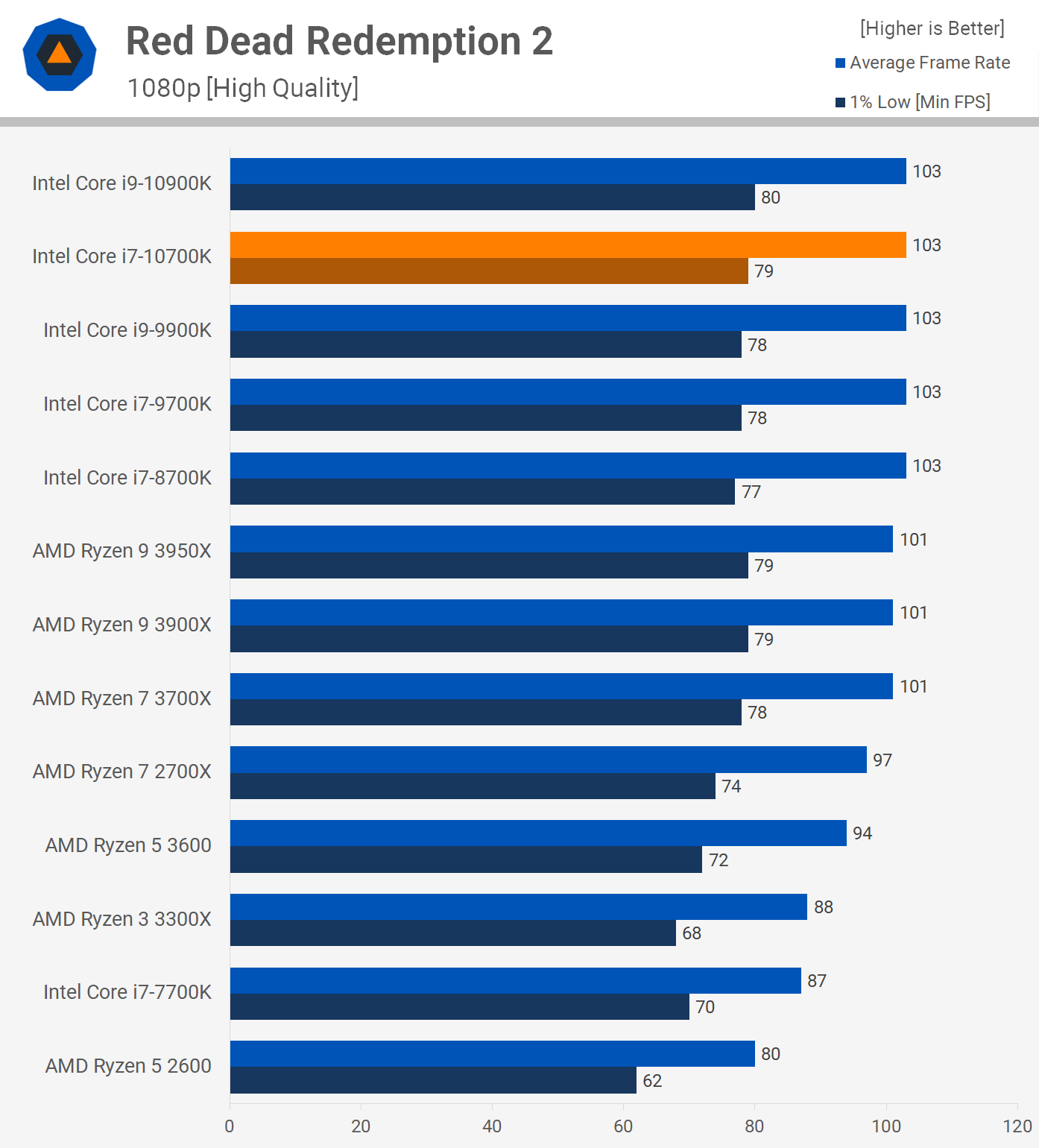
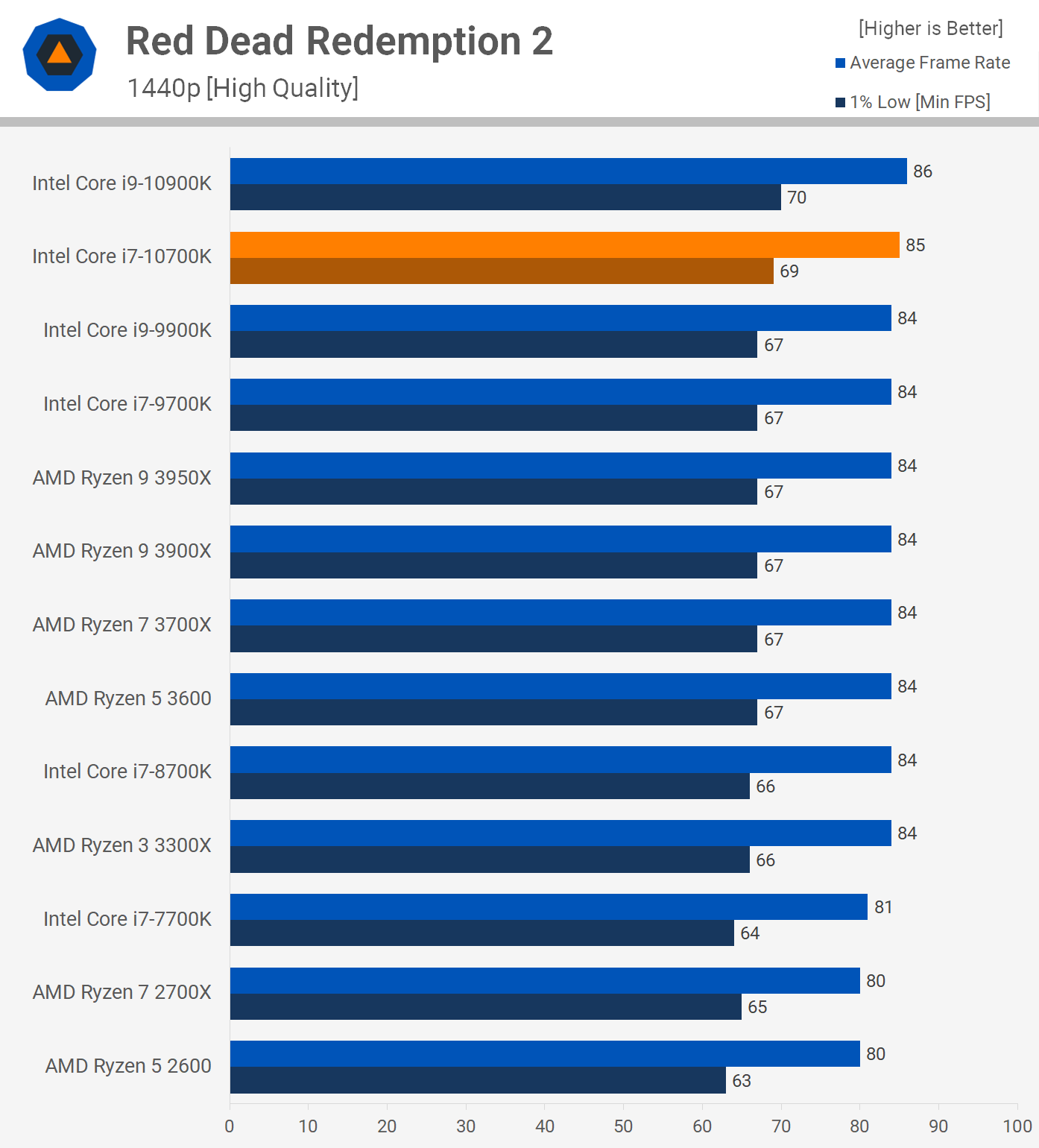
The last game we tested, Red Dead Redemption 2 shows us a strong GPU bottleneck at 1080p, despite using dialed down quality settings. The 10700K averaged 103 fps which saw it match the 10900K, along with the 9900K, 9700K and 8700K. It was also a few frames faster than Ryzen 9 and 7 processors.
The margins were reduced at 1440p and now we see basically no difference in performance between the majority of the CPUs tested.
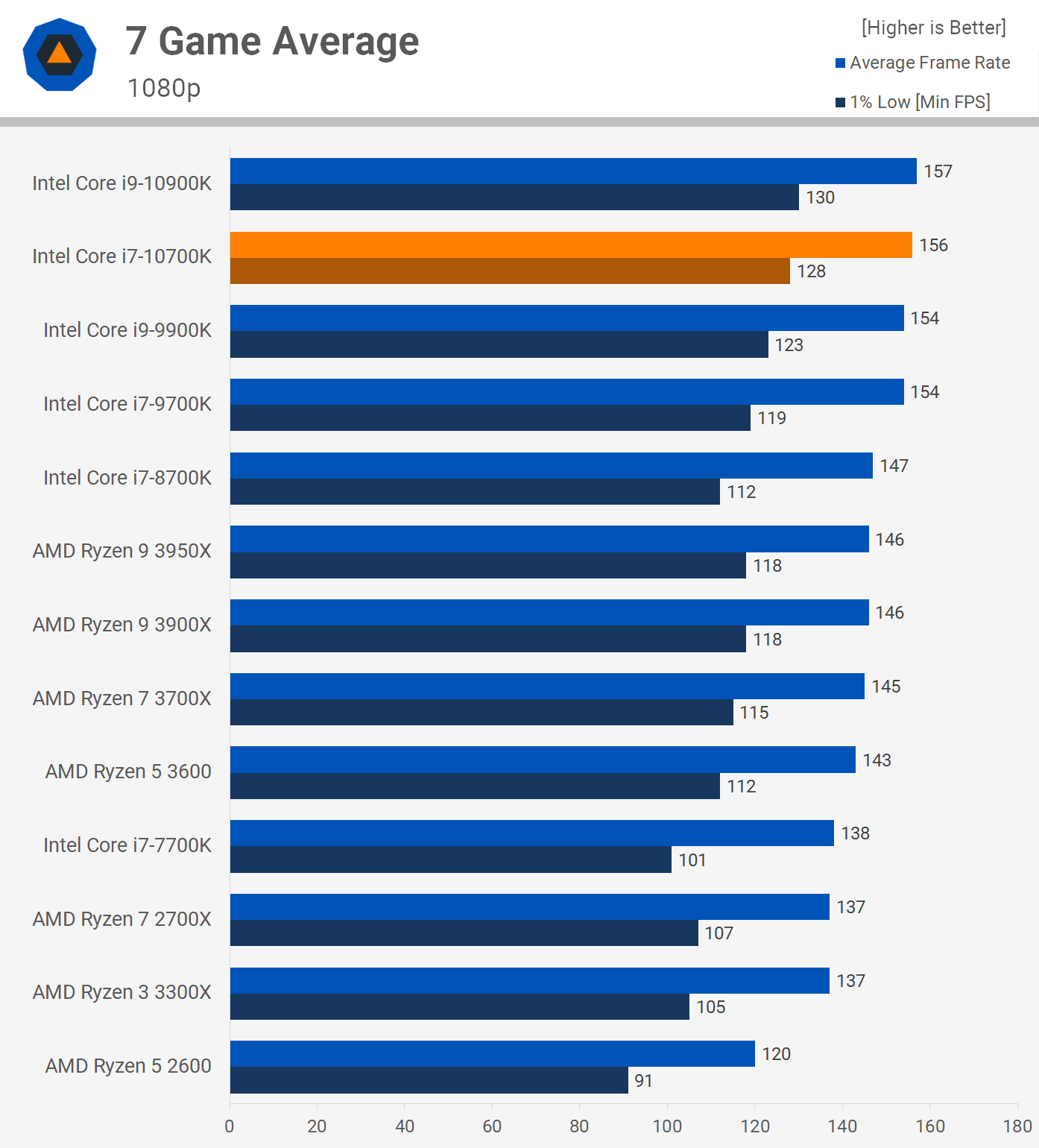
Looking at the average performance across the 7 games tested at 1080p, we see that the 10700K is basically identical to the 10900K and just a whisker faster than the 9900K. The 9700K is also very close in the average, but the 1% low performance was not up to par.
When compared to the 3900X you're looking at a 7% improvement for the average frame rate and an 8% improvement in 1% low performance. That's a reasonable advantage for gaming.
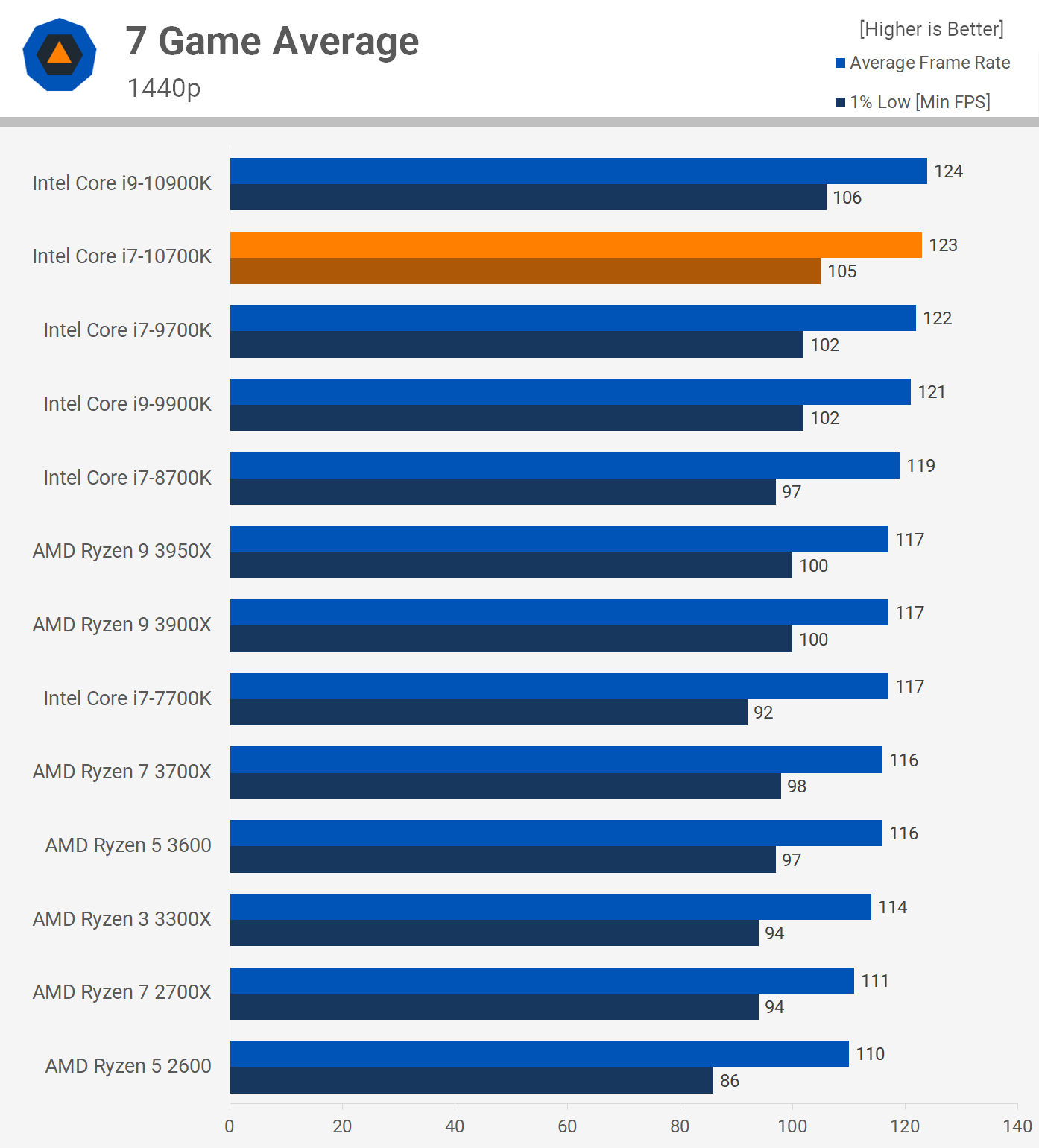
Jumping up to 1440p reduces the average frame rate and 1% low margin to just 5%, so while the 10700K is clearly faster for gaming, it's not that much faster and in most instances you won't notice the difference.
Excellent for Gaming, But...
It's time to make sense of the data. In one side, this is similar to what we saw with the Core i9-10900K. The 10700K simply can't match the value of the competing Ryzen parts in productivity applications. The Core i7-10700K is either on par with the 3700X for a massive 40% price premium or much slower than the 3900X for about the same price.
That said, the 10700K certainly makes more sense than the 10900K, as it offers the same level of gaming performance for around $100 less. With that in mind, we look forward to testing the Core i5-10600K which may be one of Intel's most compelling 10th-gen products. The 10600K is basically an overclocked 8700K and given the 8700K offers a similar level of gaming performance to that of the 10700K and by extension the 10900K, this will be the CPU to get if you're gaming exclusively. The 10600K is obviously more affordable at just $280.
The 10700K and 10900K suffer from the fact that games don't require more than a 6-core, 12-thread processor in 2020 and we doubt that's going to change anytime soon. So if you want to go Intel for gaming, spending $100 or $200 more on those Core i7 and Core i9 parts won't make sense. And if you want both the gaming and the productivity performance, Ryzen can cover both fronts quite convincingly. At the ~$400 price point there's simply no going past the R9 3900X.
The 10700K is certainly a good deal compared to the outgoing Core i9-9900K, but we should find out first if the 10600K can offer the same gaming experience at a much cheaper price. Had Intel been able to offer the 10700K at $300 then it's certainly something we could recommend as a Ryzen 7 3700X alternative, but at $375 or more, it's a pass for now. Availability looks to be a key issue as we mentioned with the 10900K, and while we were able to purchase this Core i7-10700K chip on release day, we've been told stock is extremely limited, so getting your hands on one might prove extremely difficult.
